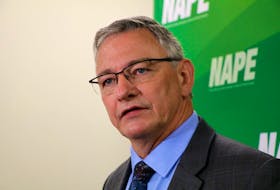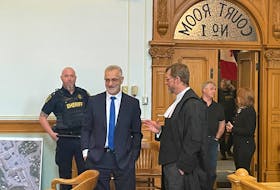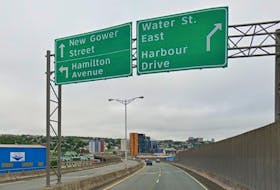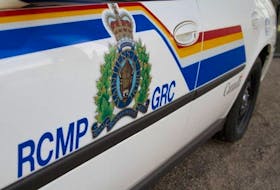
— Photos by Geraldine Brophy/The Western Star
Dusseault, a professor of earth and environmental sciences at the University of Waterloo in Ontario, was one of two speakers at the Memorial Presents: The Facts about Fracking, An Engineering Perspective talk hosted by the Harris Centre at the Greenwood Inn and Suites in Corner Brook Thursday night.
The other speaker was Lesley James, an assistant professor in the faculty of engineering and applied science at Memorial University.
While James’ presentation focused on rock formations and the need to fracture in order to get at the oil and gas deposits, Dusseault looked more at the actual practice.
He said it is one that, if done properly, can be done safely. And he disputed information to the contrary.
When it came time to open the floor to questions from the more than 150 people in attendance, it soon became clear that those opposed to the practice took exception with not only Dusseault’s presentation, but with the Harris Centre for not having someone to present the opposing side in what many thought was supposed to be a debate.
Dusseault answered their criticism and stood his ground on the facts he presented. Afterwards he said part of the problem lies in the newness of the practice.
“It’s ill understood and my job, as much as I can, is to try to overcome that.”
He said if people went to Alberta and looked at the hundreds of thousands of wells drilled and the fracturing that has gone on, they would see that it hasn’t destroyed the environment and it hasn’t destroyed the groundwater.
He agreed that there will be incidents, but said it’s the same as for hydro power or refineries.
“You can’t stop it from happening.”
In terms of risks, he suggested there are others, such as the transport of chemicals, that pose greater threats than the fracking process.
But he also agreed that people have a right to be concerned and said they should speak out about those concerns.
Jody Caines, an environmental sciences student at Grenfell Campus, Memorial University, approached Dusseault following the presentation to thank him for providing information. He said he attended the presentation to find out what the consequences of fracking are, and felt Dusseault explained it clearly.
“I think the people jumped on him for things he didn’t really try to cover, but I think he did a good job of explaining what’s involved with fracking,” said Caines.
“He told them what they didn’t want to hear. He told them the facts, but the facts didn’t jive with what they wanted to hear.”
The event wasn’t the most controversial the Harris Centre has ever hosted. Rob Greenwood, executive director of the centre, said there have been tough ones on the fishery, oil revenues and teacher stress.
“On tough emotional issues, all we can do is our best,” said Greenwood. “What we find is if you try to address everything at once it’s too messy. No one can get clarity on anything.”
Greenwood said he would love to come back and do it again with a different focus.
The Western Star








